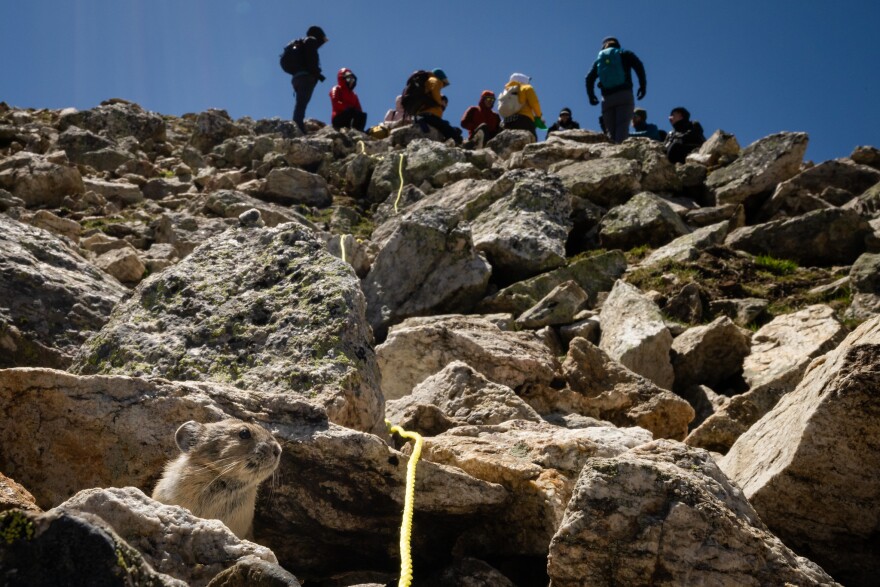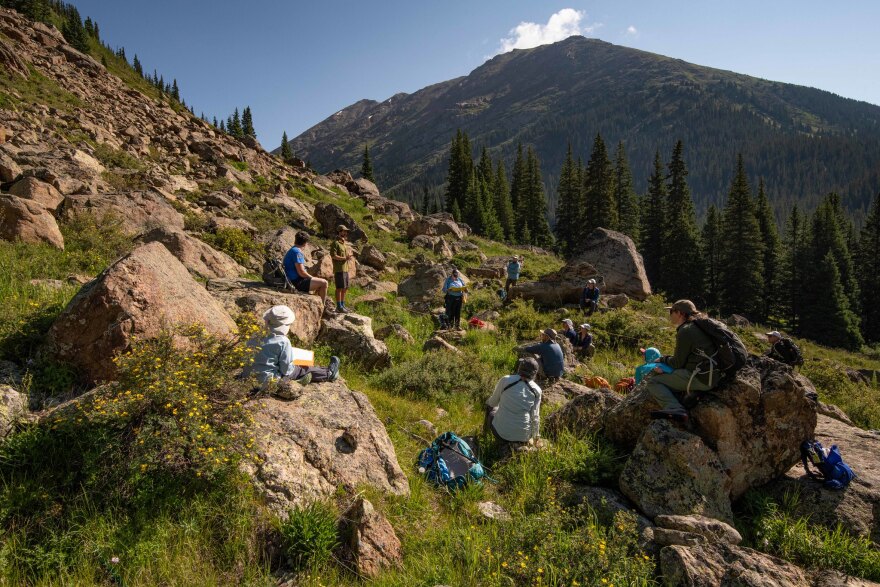Community members are invited to head up Independence Pass on Saturday to learn how to help count and observe pikas in their natural habitat.
The small animals that look like hamsters are often seen perched on rocks, and most high-elevation hikers will recognize their loud, high-pitched squeaks.
They aren’t just cute though: Pikas play an important role in the food web of our high alpine environment, and for the past 13 years, the Colorado Pika Project has been studying how climate change is impacting them.
The initiative is a partnership between the Denver Zoo and Rocky Mountain Wild. The project started working in the Roaring Fork Valley a few years ago.
Aspen Public Radio’s Eleanor Bennett recently spoke with Alex Wells, who grew up in Aspen and has been with the project for several years, about the upcoming volunteer training he helped organize.
Participants will be meeting at the Linkins Lake trailhead, which is also the Upper Lost Man trailhead, on Independence Pass on Saturday at 8 a.m. Those interested in attending the training can sign up here.
The conversation below has been edited for clarity and length.

Eleanor Bennett: Can you tell us a little bit more about the project and why it's focused on pikas?
Alex Wells: Yeah, so the Colorado Pika Project is a community science initiative. We are bringing together volunteers from across Colorado to keep tabs on the American pika, which is this fluffy little rabbit relative that only lives high up in the mountains. And we're interested in pikas because they're really sensitive to temperature and Colorado's getting warmer. Our snowpack is decreasing on average each year, and our concern is that pikas might start to disappear as well.
Bennett: And what have you learned so far about how pikas are doing here in the valley and across the state?
Wells: So it seems like at the moment, pikas are doing pretty alright up at high elevations, like in the core habitat that people think pikas only live in. But pikas do get down to lower elevations too—and when I say lower, I still mean above about 8,000 feet, but in the forest. So in some of those places, we are starting to see signs that they are on the decline here in Colorado. In other places like the Great Basin or some ranges in California or Utah, pikas have already disappeared. They're not there anymore. And there are some models that suggest that that is going to happen here in Colorado too by the end of the century. So what we want to do now is continue the dataset that we're gathering in White River National Forest and Rocky Mountain National Park, especially. So those two places, we've only been really monitoring at full scale there for about three years now, and we want to get a longer dataset to draw some conclusions about how pikas are doing right now.
Bennett: And is climate change the main driving factor or are there other things at play as well?
Wells: That is a good question. Our evidence suggests that it's climate change. In science, you're always cautious to say 100% that it's one single thing, but we are pretty confident that climate change has an impact on pikas. And I think the more interesting aspect of that is, ‘What is it about climate change? Is it making it harder for them to gather food in the summer that they need to survive for the winter? Is it making it harder for little pikas to find new patches of habitat to live in? Are they freezing to death in the winter because the snow is melting earlier and so there's not that insulating layer to keep them warm in the springtime?’ That's something that we're trying to figure out too.

Bennett: And how does all this connect to what you'll be doing up Independence Pass this weekend?
Wells: So July 22, this coming Saturday, Colorado Pika Project staff are going to be running a new volunteer training for all ages. Little kids go out with their families. Retirees can enjoy getting out into ‘pika world.’ It's an awesome experience and a useful way to be a part of climate solutions.
Bennett: And if folks can't make it on Saturday, are there other easy ways for them to get involved?
Wells: We actually, just this past September, released our app Pika Patrol, which is like iNaturalist, but pika-specific. It helps us ask questions that really dig into the things we are most interested in with pika observation. So if folks find that the training session is a bit too much information, then they can just download the app, and all the information folks need to gather simple data on pikas is right inside of that.
Bennett: Is there anything else you'd like people listening to know about volunteering with the Pika Project?
Wells: Volunteering as a ‘pika patroller’ is honestly one of the most fun ways to get out and volunteer if you like being in the mountains. Pikas have excellent taste in habitat and they only live in the most beautiful places, so you can help us understand how they're being impacted by climate change and how climate change is hitting us here in the Roaring Fork Valley while having a beautiful day outside with your friends or family.


